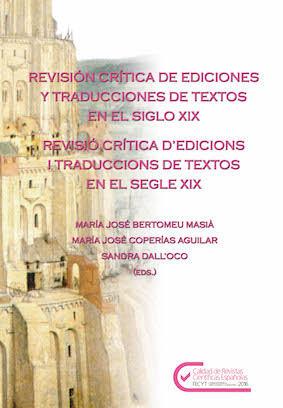Ferrarese Chronicles in the Modern Era
DOI:
https://doi.org/10.7203/qdfed.22.11256Paraules clau:
Ferrara, cròniques, Renaixement, documents antics, edició de textos Resum
Resum
En 1928, Giuseppe Pardi va publicar la primera de tres cròniques del segle XV sobre Ferrara. La seua edició d'un d'aquestes tres cròniques, el Diari ferrarese dall’anno 1409 sinó al 1502, va substituir versió del segle XVIII publicada per Ludovico Muratori. Pardi va mostrar una comprensió dels reptes que presenta la transcripció de documents antics, refusant alterar aquest material i enriquint les cròniques amb un aparell crític complet. Malgrat la disponibilitat i fàcil accés a materials inimaginables fins fa poc, les transcripcions de finals del segle XX no arriben als estàndards establerts per Pardi. Aquest article explora les transcripcions de les cròniques, en particular les de Pardi, il·lustrant com els inicis del segle XX van ser una època daurada sense igual abans o després.
 Descàrregues
Descàrregues
Descàrregues
Publicades
Com citar
-
Resum393
-
PDF (Español)573
-
PDF104
-
PDF 96
Número
Secció
Llicència
 Este obra está bajo una licencia de Creative Commons Reconocimiento-NoComercial-SinObraDerivada 4.0 Internacional.
Este obra está bajo una licencia de Creative Commons Reconocimiento-NoComercial-SinObraDerivada 4.0 Internacional.
Tots els documents inclosos a OJS són d'accés lliure i propietat dels seus autors i/o institucions editores, i per tant, qualsevol acte de reproducció, comercialització, comunicació pública o transformació total o parcial necessita el consentiment exprés i escrit d'aquests.
________
Authors who publish with this journal agree to the following terms:
- Authors retain copyright and grant the journal right of first publication with the work simultaneously licensed under a Creative Commons Attribution License that allows others to share the work with an acknowledgement of the work's authorship and initial publication in this journal.
- Authors are able to enter into separate, additional contractual arrangements for the non-exclusive distribution of the journal's published version of the work (e.g., post it to an institutional repository or publish it in a book), with an acknowledgement of its initial publication in this journal.
- Authors are permitted and encouraged to post their work online (e.g., in institutional repositories or on their website) prior to and during the submission process, as it can lead to productive exchanges, as well as earlier and greater citation of published work (See The Effect of Open Access).




